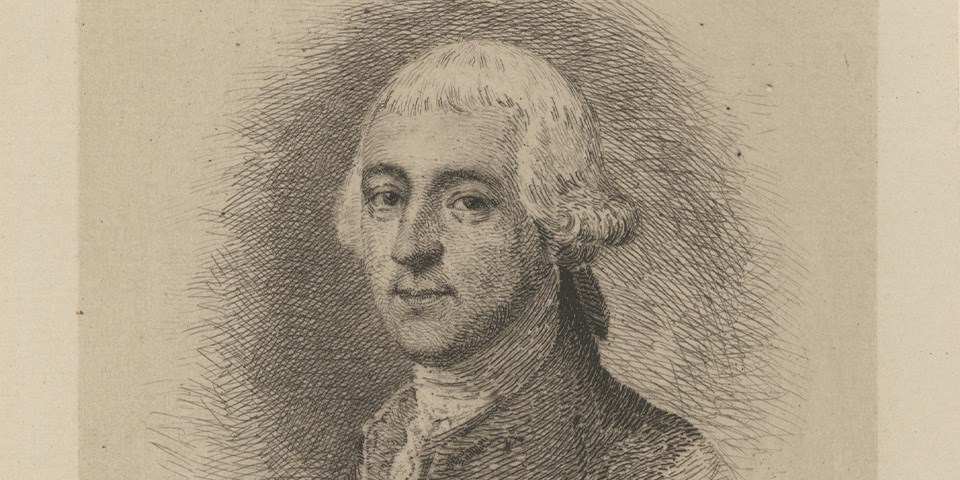Part of a series of articles titled The Constitutional Convention: A Day by Day Account for August 1 to 15, 1787.
Article
August 7, 1787: The Right to Vote

New York Public Library Digital Collections, https://digitalcollections.nypl.org/items/510d47da-2cf2-a3d9-e040-e00a18064a99
"There is no right of which the people are more jealous than that of suffrage."
--Pierce Butler
The Convention started to work its way through the twenty-three articles of the draft Constitution created by the Committee of Detail. The first three articles were approved with some wrangling over wording and minor issues.
The day’s controversy came with Article IV’s language, which said that anyone who was allowed to vote in a state’s elections would be allowed to vote in elections for US representatives. Generally, states at this time only granted voting rights to white men who owned property, but not all states had the same property requirements. No one in the Convention argued for expanding voting rights to women or racial minorities. Rather, some delegates wanted the federal government to have its own, additional property qualification for voters—a qualification that would be stricter than the property requirements of some of the states.
The argument was started by Gouverneur Morris (PA), seconded by Fitzsimons (PA), who made a motion to strike the current voting eligibility language in the draft Constitution. He did not yet have a proposal for what to replace it with, but the newer language would grant the right to vote to fewer Americans.
Williamson (NC) and Wilson (PA) were opposed, with Wilson saying it would be too complicated to have separate sets of voting qualifications on the federal and state levels. Ellsworth (CT) also liked the current language, saying, “The right of suffrage was a tender point, and strongly guarded by most of the State Constitutions. The people will not readily subscribe to the National Constitution if it should subject them to be disfranchised.” Mason (VA) said that having a property requirement, as the British had for their electorate, was an “ancient prejudice” and a symptom of failing to think like post-revolutionary Americans. Butler (SC) worried that restricting the franchise further would result in “rank aristocracy.”
Dickinson (DE) was the first to speak for G. Morris’s motion besides G. Morris himself. Dickinson worried about “those multitudes without property and without principle, with which our country, like all others, will in time abound.” He stated that freeholders were currently a majority of the citizenry and were “the best guardians of liberty.” G. Morris went further, saying the unpropertied would sell their votes to their employers instead of voting independently. “Children do not vote. Why? Because they want prudence; because they have no will of their own. The ignorant and the dependent can be as little trusted with the public interest.” Madison (VA) echoed some of these concerns using less abrasive language.
Ellsworth (CT) countered with a core argument of the American Revolution: that those who are taxed (many of whom owned no property) should be able to elect those who make taxes. Franklin (PA) also spoke against a property requirement and in defense of the laborers G. Morris had disparaged. He did not think that they could be so easily manipulated or their votes so easily bought, noting how working-class American sailors, when harshly imprisoned by the British during the war, refused release from captivity when offered to join the British navy and receive a share of the spoils from captured American ships. Franklin “did not think that the elected had any right in any case, to narrow the privileges of the electors.”
Mercer (MD), who had only arrived the day before, found the Constitution “objectionable in many points, but in none more than the present.” He not only disapproved of the lack of property qualifications, but he thought it was a poor idea to have representatives be elected in the first place. “The people cannot know and judge of the characters of candidates. The worst possible choice will be made.”
Rutledge (SC), speaking last, thought a property requirement would create a terrible rift in society “and make enemies of all those” unable to vote.
G. Morris’s motion failed 1–7–1–1, with only Delaware in support, Maryland divided, and Georgia absent.
- The Convention started going through the draft Constitution, one article at a time.
- A motion to create an additional property requirement for voters in federal elections was hotly debated and then voted down.
- Washington (VA) dined and spent the evening with the family of Robert Morris (PA). He also dropped a note to his friend, Col. Clement Biddle, to ask him to procure and send to Mount Vernon several items, including pickled walnuts, mangoes, some books, a Venetian blind, and the weathervane for his home, Mt. Vernon, which he had commissioned from a Philadelphia metalworker.
- The day was clear, warm, and humid after a morning fog.
Last updated: September 22, 2023
